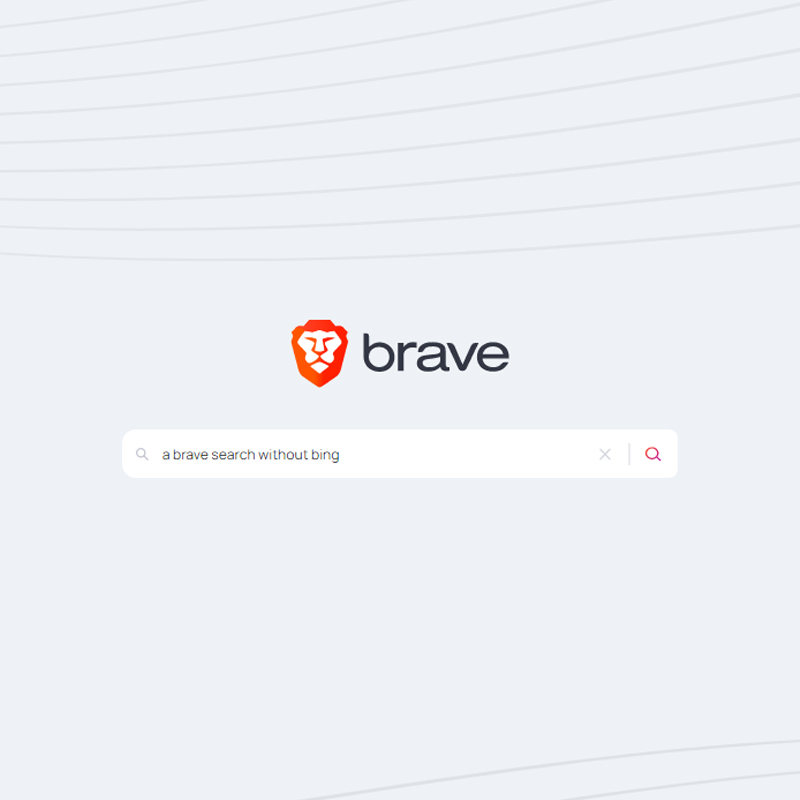
Brave Software, Inc. is best-known for its Brave web browser. Besides other of its products, it's also known for its Brave Search search engine.
The search engine was developed in-house, and was released in beta in March 2021, following the acquisition of Tailcat, a privacy-focused search engine from Cliqz. While it has grown its resources as years past, it was relying on Microsoft Bing to populate many of its search engine results pages.
The web is big, and only a handful of tech companies can totally index everything, if not most of it.
But again, Brave is no longer a small company.
It no longer owns relatively-unknown products, because as of August 2022, Brave claimed to have more than 57.42 million monthly active users, 19.3 million daily active users, and a network of more than 1.6 million content creators.
it’s even averaging about 22 million queries per day.
Because of that, Brave is already big enough to sustain the burden of operating independently.
Today we're thrilled to announce Brave Search is now 100% independent!
We've removed the last remnants of Bing from our privacy-preserving search engine's results so users are now entirely served by Brave's independent search index.
Read more here: https://t.co/kdXosa7IMn pic.twitter.com/OFpi2GpIsK— Brave Software (@brave) April 27, 2023
In a blog post, the company is proud to announce that its Brave Search is finally completely Bing-free, private, and independent.
"When Brave Search launched in June 2021, about 13% of the queries required the help of third parties to achieve the desired level of quality across various types of queries. Total independence, however, was a primary goal of Brave, and in less than a year the Brave Search global independence score rose from 87% to 93%."
With following consecutive milestones, the achievements allowed Brave "to accelerate this milestone of 100% independence."
While Brave could indeed continue its partnership with Microsoft, saving it from the pain of maintaining a resource-hungry search engine by itself, Brave said that it considered goind solo because of the "uncertainty over the future of the Bing API."
Since OpenAI introduced ChatGPT, and following Microsoft's partnership with OpenAI, the tech titan is moving pretty fast, spreading its generative AI capabilities to more of its products.
And in Bing, where Microsoft generative AI chatbot originally resides, Microsoft is making numerous changes to the search engine in quick paces, that Brave is fearing for the continuity of the Bing service.
What's more, Microsoft also announced an unprecedented increase in its API pricing. which was made due to the increasing amount of resources demanded by third-party search engines that rely partly or fully on the Bing Search API.
"The consequences of their reliance on Bing will play out in the following months when their long term contracts expire," said Brave.

Brave is able to take this bold step of going independent, because Brave had both an independent index, and a built-in delivery mechanism (the Brave browser) to continue improving the Brave Search index.
Because of this, "Brave Search users will now receive 100% of results from the Brave Index, giving users fully independent results," and that this is set as default.
But again, since there should be unforeseen consequences of this switch, Brave said that users can utilize Google Fallback as an option, and that users can also continue to support the growth of the index and results quality by opting into the Web Discovery Project, and submitting feedback "in cases where we should improve."
Using data from Web Discovery Project, Brave can continue improving its Brave Search independent index, to "ensure we show relevant results to your search queries and support more relevant experiences with Brave products and services."
"This removal of all Bing API calls may have an effect for certain queries, or for some regional or language-specific results, so we encourage users to submit feedback as often as possible," said Brave.
In the end, Brave wants to be the alternative to Bing Tech, and plans to release the Brave Search API. Through it, developers and companies should be able to build search experiences that compete on quality with Big Tech.
You can help us continue improving Brave Search by:
- Sharing feedback on search results.
- Opting into the Web Discovery Project: https://t.co/XVS4IWE0Y8
- Customizing your search results with Goggles: https://t.co/Tg7lwujghI
- Telling your friends about the search engine!— Brave Software (@brave) April 27, 2023